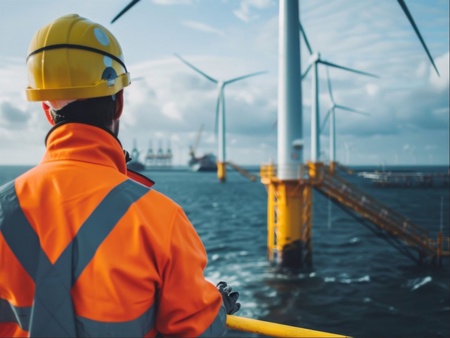The development of offshore renewable energy (ORE) technologies is being heralded as an essential element of global efforts to reduce emissions and protect the planet.
But as advances continue to be made on innovations that fully harness the ocean’s power, a new project will examine some of the opportunities and challenges associated with future deployments of offshore wind, wave and tidal power installations.
The OcEn project will explore how ORE can support the fight against climate change, and the potential benefits for the global environment and economy that could be gained from the industry’s expansion.
It will also examine whether the world’s manufacturing, construction and logistics sectors are ready to meet the demands of an expanded ORE sector.
And it will work with stakeholders and communities who depend on the ocean and identify any concerns they have about the potential for ORE to impact their livelihoods, cultural sites, and the marine environment more widely.
The University of Aberdeen is supporting the £1.7million project which is being led by researchers from the University of Plymouth’s Centre for Decarbonisation and Offshore Renewable Energy. A further nine of other universities across the UK, USA, Canada and Australia are also involved.
With the different countries at similar stages in their ORE journeys, and having similar visions for the future rollout of ORE, the hope is that pooling knowledge and ideas will benefit the drive for net zero and clean energy globally.
Professor John Underhill, Director for Energy Transition at the University of Aberdeen, said: "We are delighted to be an active partner in the OcEn consortium. The initiative allows our Interdisciplinary Research Institute to build on and deepen our existing successful collaboration via the GeoNetZero Centre for Doctoral Training, which we lead and the University of Plymouth is part of.
"The new research award enables our Energy Transition researchers to work with others to face the challenges and opportunities that offshore renewable technologies present as we strive the decarbonise the energy sector and meet net zero targets.”
Professor Lars Johanning, Chair in Ocean Technology at the University of Plymouth and the OcEn project lead, said: “There is a lot of talk globally about the development of ORE and the benefits it could potentially deliver. However, this project aims to look at some of the other factors that could emerge alongside the development of technologies and sites.
"Many of those could concern the public, as well as other interested parties such as the fishing and shipping industries and wildlife organisations. By talking to them now, we can generate better understanding about the ORE sector and any issues it might encounter as it develops, but also reassure people that their thoughts and concerns are being taken into consideration before the significant expansion of sites begins in earnest.”
Running from 2024 to 2028, the OcEn consortium comprises world-leading experts in ORE research and innovation, and aims to provide guidance for policy makers, site developers, scientists, industry and communities.
Its work will centre around four research themes: Environmental Assessment and Regulation; Technology Readiness and Innovation; Energy Systems and Integration; and Community Impacts and Community-Driven Co-design.
This will enable the project team to develop a global understanding of research carried out around the ORE agenda and identify existing knowledge gaps that need to be filled.
As well as established experts from across the world, the project will also enable up to 12 early career researchers – including nine PhD students – to work alongside them, creating an interdisciplinary team of future leaders spanning subjects from engineering and the environment to commercialisation and social science.
It will also coordinate an Innovation Training Programme, as well as international workshops, mini-conferences and academic secondments.
Professor Robert Perrons, Professor of Technology Management and Strategy at Queensland University of Technology, said: “Australia has over 34,000km of coastline, and most of the country’s people live not too far away from an ocean. It therefore follows that there is tremendous upside for Australia in improving ORE technologies, and it is our absolute pleasure to be a part of this exciting global partnership.”
Curran Crawford, Accelerating Community Energy Transformation (ACET) Executive Director, and Brad Buckham, ACET Marine Renewable Energy lead, at the University of Victoria (UVic) in Canada, said: “The University of Victoria (UVic) is proud to contribute to the OcEn’s timely and important work. Through the Accelerating Community Energy Transformation (ACET) initiative, we bring three decades of knowledge and innovation developed by the Institute for Integrated Energy Systems, which has kept UVic researchers at the forefront of community-led, offshore renewable energy research in Canada.
"Climate change is a global challenge that requires a global response – and offshore renewable energy has a critical role to play in that effort.”


